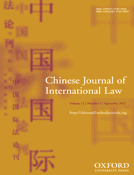
Chinese Journal of International Law
Scope & Guideline
Shaping the Future of International Law Discourse
Introduction
Aims and Scopes
- International Law and China's Role:
The journal consistently examines China's position and contributions to international law, exploring themes such as state sovereignty, foreign investment law, and China's evolving legal frameworks within the global system. - Interdisciplinary Approaches:
There is a notable emphasis on interdisciplinary methodologies, integrating perspectives from political science, economics, and sociology to analyze international legal issues, thus enriching discussions on law and governance. - Focus on Emerging Legal Issues:
The journal often addresses contemporary challenges such as cybersecurity, climate change, and space law, reflecting a commitment to exploring pressing global issues through the lens of international law. - Regional Dynamics and International Relations:
A significant focus is placed on the dynamics within the Asia-Pacific region, including maritime disputes, joint development agreements, and regional cooperation frameworks, highlighting the journal's relevance in regional legal discourses. - Judicial and Institutional Developments:
The journal regularly publishes analyses of judicial decisions and developments in international institutions, particularly those affecting international humanitarian law, human rights, and state responsibilities.
Trending and Emerging
- Cybersecurity and International Law:
The increasing focus on cybersecurity reflects the growing concerns about state sovereignty and digital governance, highlighting the need for legal frameworks that address cyber threats and state responsibilities. - Climate Change and Environmental Governance:
There is a marked increase in discussions on climate change, particularly regarding the legal obligations of states under international treaties, emphasizing the importance of environmental law in contemporary discourse. - Autonomous Technologies and Regulation:
Emerging themes around autonomous technologies, particularly in shipping and military applications, indicate a trend towards exploring the legal implications of technological advancements on international law. - Human Rights and International Humanitarian Law:
Recent publications show a heightened interest in the intersection of human rights and humanitarian law, particularly in conflict zones, reflecting the ongoing global discourse on state accountability and protection of vulnerable populations. - Transnational Legal Issues:
Increasing attention is being given to transnational legal issues such as migration, trade, and investment facilitation, signaling a shift towards understanding international law in a more interconnected and globalized context.
Declining or Waning
- Traditional State-Centric Legal Frameworks:
There is a noticeable decline in papers focusing solely on traditional state-centric international law, as discussions increasingly encompass non-state actors and transnational legal issues. - Historical Analyses of International Law:
While historical perspectives remain important, recent publications suggest a waning interest in purely historical analyses, with more emphasis placed on contemporary applications and future implications of international law. - Focus on Bilateral Relations:
Research centered on bilateral legal agreements has diminished, giving way to broader discussions on multilateral frameworks and global governance, indicating a shift in analytical scope. - Narrow Interpretations of International Norms:
There appears to be a decline in works that strictly interpret established international norms, as scholars now favor critical and innovative approaches that challenge conventional understandings. - Limited Focus on Theoretical Perspectives:
Theoretical discussions, particularly those rooted in classic international law doctrines, have seen reduced attention in favor of pragmatic analyses that address current global challenges.
Similar Journals

Journal of International Humanitarian Legal Studies
Fostering Dialogue on Human Rights and LawJournal of International Humanitarian Legal Studies is a premier academic journal published by BRILL, focusing on the evolving landscape of humanitarian law within the context of international relations and global human rights. With an ISSN of 1878-1373 and an E-ISSN of 1878-1527, this journal provides an invaluable platform for scholars, practitioners, and students to explore significant legal issues, new theories, and policy approaches that inform humanitarian action and justice. The journal is held in high esteem, achieving a Q2 ranking in the field of Law as per the 2023 category quartiles and ranking #328 out of 1025 in the Scopus database, placing it in the 68th percentile. Though it does not currently offer open access options, its comprehensive and rigorous content makes it essential reading for those engaged in the study and practice of international humanitarian law. Published continuously from 2010 to 2024, the journal aims to foster interdisciplinary dialogue and bridge gaps between legal theory and practice.

Revista General de Derecho Europeo
Fostering Dialogue in European Legal StudiesRevista General de Derecho Europeo is a prestigious academic journal dedicated to the study of European law, published by IUSTEL, a notable publisher recognized for its commitment to legal scholarship. This journal serves as a vital platform for the dissemination of cutting-edge research, fostering dialogue among scholars, practitioners, and policymakers in the field of European legal studies. With an ISSN of 1696-9634, it provides no-cost access to a diverse range of articles, ensuring that the latest developments in European jurisprudence are readily available to a broad audience. Although specific impact metrics such as the H-index are not detailed, the journal’s emphasis on quality and relevance positions it as an essential resource for anyone engaged in exploring the complexities of European law, its implications, and its evolution within a global context. Revista General de Derecho Europeo not only contributes to academic discourse but also equips its readers with critical insights necessary for navigating contemporary legal challenges in Europe.

International Community Law Review
Navigating Complexities of Global Justice.International Community Law Review, published by MARTINUS NIJHOFF PUBLISHERS, is a distinguished journal that contributes significantly to the fields of law and international relations. With an ISSN of 1871-9740 and an E-ISSN of 1871-9732, this journal serves as a vital platform for scholarly discourse on issues pertaining to international law, promoting a deeper understanding and engagement with complex legal frameworks and global challenges. Currently classified in the Q3 quartile for Law and Political Science and International Relations, the International Community Law Review ranks 475 out of 1025 in the Law category and 386 out of 706 in Political Science, reflecting a moderate impact in the academic community. Though it does not currently offer Open Access, the journal's extensive coverage from 2007 through 2024 ensures that it remains a relevant resource for researchers, professionals, and students. Published in the Netherlands, this journal aims to foster the development of international legal thought, support academic research, and facilitate discussions that shape modern international legal practices.

Canadian Yearbook of International Law
Advancing the Discourse of International LawCanadian Yearbook of International Law, published by Cambridge University Press, serves as a vital platform for scholarly discourse within the realms of law and international relations. With a rich history dating back to 1989, the journal engages a diverse audience of researchers, academics, and practitioners by offering insightful analyses of contemporary legal issues and policy debates. Although the journal currently holds a Q4 quartile ranking in both the law and political science categories, it remains an essential resource for understanding the evolving landscape of international law. Despite the current limitations in access options, the journal's rigorous peer-review process ensures that each publication maintains high academic standards, encouraging thoughtful discussions that contribute to both theoretical and applied aspects of international law. The Canadian Yearbook helps bridge gaps in knowledge and fosters greater understanding among scholars worldwide, enhancing its significance in the academic community.
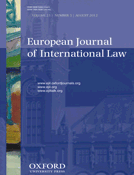
European Journal of International Law
Advancing the discourse on global legal frameworks.The European Journal of International Law (EJIL), published by Oxford University Press, stands as a leading platform for the dissemination of innovative research in the realms of International Law and Political Science. With an impressive ISSN of 0938-5428 and E-ISSN of 1464-3596, this prestigious journal has achieved Q1 rankings in both Law and Political Science and International Relations categories as of 2023, emphasizing its significance among contemporary scholarly publications. Spanning contributions from a diverse range of disciplines, the EJIL serves as an essential resource for researchers, professionals, and students alike, promoting critical dialogue on pressing international legal issues. Although currently not offered as an open-access journal, it continues to retain a high impact factor, as evidenced by its substantial Scopus rankings, placing it within the top percentiles in multiple categories. Its commitment to scholarly excellence is reflected in a convergence of research trends from 2005 to 2024, and it remains dedicated to fostering informed discourse on global legal frameworks and their implications.
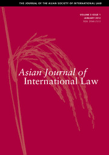
Asian Journal of International Law
Navigating the Complexities of Asian Legal FrameworksThe Asian Journal of International Law, published by Cambridge University Press, is a premier academic journal dedicated to advancing the discourse on international law across Asia and beyond. With its ISSN 2044-2513 and E-ISSN 2044-2521, the journal has carved a significant niche in the field, achieving a Scopus rank of #463 out of 1025 in the Social Sciences category, placing it in the 54th percentile. As of 2023, it holds a Q3 category in law, reflecting its growing influence and recognition within the academic community. The journal features peer-reviewed articles that critically engage with contemporary legal issues, promote scholarly debate, and provide insights into the legal frameworks affecting the Asia-Pacific region. With no open access options currently available, it caters primarily to academics, professionals, and students seeking in-depth knowledge and critical analysis. The Asian Journal of International Law aims to be at the forefront of international legal scholarship, fostering an understanding of the complex legal landscapes that shape our world.

Melbourne Journal of International Law
Connecting Scholars and Practitioners in International LawThe Melbourne Journal of International Law (ISSN: 1444-8602, E-ISSN: 1444-8610), published by the esteemed University of Melbourne, Melbourne Law School, is a premier forum for scholarly discussion and research in the field of international law. This journal aims to provide rigorous and innovative analyses of contemporary legal issues that transcend national borders, making significant contributions to both theory and practice. With its commitment to disseminating high-quality scholarship, the journal engages a diverse readership, including researchers, legal practitioners, and students, fostering a rich dialogue on the complexities of international legal frameworks. Although it does not currently offer open access, the Melbourne Journal of International Law remains a vital resource for those seeking to navigate the evolving landscape of international jurisprudence.
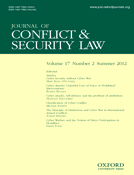
JOURNAL OF CONFLICT & SECURITY LAW
Bridging Gaps in Conflict Studies and Security LawThe Journal of Conflict & Security Law, published by Oxford University Press, is an essential source of scholarly information in the fields of law, conflict studies, and security policy. With an ISSN of 1467-7954 and an E-ISSN of 1467-7962, this journal has been a significant platform for rigorous academic discourse since its inception in 2005. It is recognized for its contributions to the legal frameworks surrounding conflict and security, currently holding a Q3 ranking in Law and Q4 in both Safety Research and Safety, Risk, Reliability, and Quality for the year 2023. With its Scopus rankings placing it in the 61st percentile in Social Sciences Law, the journal serves as a key reference point for researchers and professionals looking to navigate the complexities of contemporary security challenges. Though the journal is not open access, its detailed analyses are critical for informed policy-making and academic inquiry, making it indispensable for students, scholars, and practitioners alike. For comprehensive insights and empirical studies, Journal of Conflict & Security Law remains at the forefront of legal and security research.
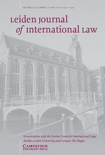
Leiden Journal of International Law
Illuminating contemporary challenges in international law.Leiden Journal of International Law, published by Cambridge University Press, stands as a leading platform for scholarly discourse in the fields of international law and political science. With its ISSN 0922-1565 and E-ISSN 1478-9698, the journal has established a significant academic presence since its inception in 1988, upholding rigorous standards through a robust peer-review process. The journal is notable for its impressive impact factor, categorizing it in the Q1 quartile for law and Q2 for political science and international relations, indicating its widespread influence and recognition among scholars. As a vital resource for researchers and practitioners, the journal contributes to the advancement of legal scholarship and promotes critical discussions surrounding contemporary international issues. Although it operates under a traditional subscription model, its comprehensive analyses and critical insights make it an essential read for those engaged in the interdisciplinary examination of law and global governance. The journal is headquartered in Cambridge, England, and continues to play a pivotal role in shaping the discussions that define the contemporary landscape of international law.

Air & Space Law
Pioneering Legal Scholarship in the Skies and BeyondAir & Space Law is a prestigious academic journal published by Kluwer Law International, committed to advancing legal scholarship within the realm of air and space law. Serving as a critical platform for researchers, professionals, and students, this journal explores the intricate legal challenges arising from aviation and space exploration activities. With an ISSN of 0927-3379 and an E-ISSN of 1875-8339, it has established itself in the competitive legal landscape, currently holding a Q2 ranking in the Law category, positioning it within the top half of its field according to the latest Scopus metrics. Although it does not offer open access, the journal remains accessible to a wide audience via institutional subscriptions, disseminating pivotal insights that shape international policy and regulatory frameworks. The converged years from 2018 to 2024 reflect a commitment to evolving discourse, making it an invaluable resource for those engaged in the nuanced intersections of law, technology, and global governance.